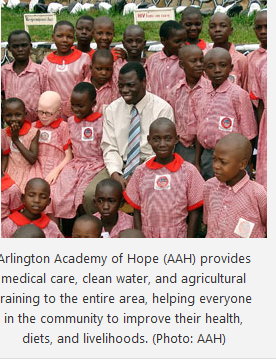 John and Joyce Wanda grew up in the villages of Bumwalukani and Bupoto in Eastern Uganda. In 1995 they came to the United States through a lottery visa and settled in Arlington, Virginia. After exposure to the Arlington public schools through their children, John and Joyce wanted to provide the same opportunities for the children growing up in their home villages. “Coming from the rural, poor village that I do, I understand what it is to feel like you can’t help yourself to succeed,” said John. “I wanted the children of my home to see what a good education is like and that they do have options.”
John and Joyce Wanda grew up in the villages of Bumwalukani and Bupoto in Eastern Uganda. In 1995 they came to the United States through a lottery visa and settled in Arlington, Virginia. After exposure to the Arlington public schools through their children, John and Joyce wanted to provide the same opportunities for the children growing up in their home villages. “Coming from the rural, poor village that I do, I understand what it is to feel like you can’t help yourself to succeed,” said John. “I wanted the children of my home to see what a good education is like and that they do have options.”
At first the goal was just to provide an education. In 1999, they started donating tuition for five children in Uganda to attend school. Within a few years, that program had grown to 126 students and John and Joyce decided to build a school. And every year, notes John, another program is added to the project. “We realized that there was a real demand for education,” said John. “Then we realized that kids couldn’t learn when they were sick so we started the clinic. Kids can’t learn when they are hungry either and so we started the farm.”
Now, much more than just a school, the Arlington Academy of Hope (AAH) provides medical care, clean water, and agricultural training to the entire area, helping everyone in the community to improve their health, diets, and livelihoods.
The farm was completed in September of last year and is the newest feature at the school. “Most of our students come from homes where 100 percent of the income comes from agriculture,” said John. “But there has been a lot of environmental degradation. The soil is poor, the trees have all been cut down, and the productivity of the land isn’t what it used to be. At the same time, the population is growing and the pressure on the land is excessive.”
It was important to John and Joyce that the students at their school learned not only how to grow the food needed to feed themselves and their families, but also how to preserve the natural resources upon which their farms depend. They are taught integrated livestock farming techniques, how to produce and use organic fertilizer, and how to plant trees to create natural wind barriers, repair soil, and provide an additional food source. And the harvested produce is used to make the daily meals the school provides for its students.
Soon the school hopes to open its agricultural training up to the entire community. Already students take home seedlings from the nursery every Friday to plant with their families. And the farm’s irrigation system provides a model for nearby households looking to conserve water and improve harvest.
The program is very popular. Every year there are over 600 applicants for the 45 spots available in the starting grade. And some students walk as much as five miles each way to attend class. John and Joyce want to continue to expand so that the program can reach even more students, and they emphasize community involvement in the hopes that one day it will all be completely self sustaining.
“We know we can’t do this alone,” says John. “This belongs to the village and everyone who lives in it is our partner. Eventually we hope that these partnerships can be worldwide so that people who leave the village, no matter where they go, are still connected to where they came from. It’s a global project at the end of the day.”
To read more about how schools are helping communities improve diets, income, and the environment, see:Turning the School Yard into a Classroom, School Feeding Programs to Improve Diets, Livelihoods and Local Economies, and Keeping Kids ‘Down on the Farm.‘

Danielle Nierenberg, an expert on livestock and sustainability, currently serves as Project Director of State of World 2011 for the Worldwatch Institute, a Washington, DC-based environmental think tank. Her knowledge of factory farming and its global spread and sustainable agriculture has been cited widely in the New York Times Magazine, the International Herald Tribune, the Washington Post, and
other publications.
Danielle worked for two years as a Peace Corps volunteer in the Dominican Republic. She is currently traveling across Africa looking at innovations that are working to alleviate hunger and poverty and blogging everyday at Worldwatch Institute’s Nourishing the Planet. She has a regular column with the Mail & Guardian, the Kansas City Star, and the Huffington Post and her writing was been featured in newspapers across Africa including the Cape Town Argus, the Zambia Daily Mail, Coast Week (Kenya), and other African publications. She holds an M.S. in agriculture, food, and environment from Tufts University and a B.A. in environmental policy from Monmouth College.








